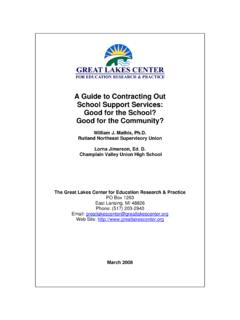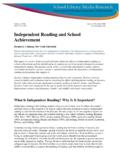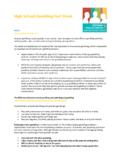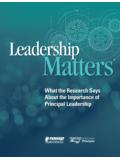Transcription of A ten-year scientific study into the nature of luck has ...
1 Barnett Helzberg Jr. is a lucky man. By 1994 he had built up a chain of highly successful jewelry stores with an annual revenue of around $300 mil-lion. One day he was walking past the Plaza Hotel in New York when he heard a woman call out, Mr. Buffett to the man next to him. Helzberg won-dered whether the man might be Warren Buffett one of the most successful investors in America. Helzberg had never met Buffett, but had read about the financial criteria that Buffett used when buying a company. Helzberg had recently turned sixty, was thinking of selling his company, and realized that his might be the type of company that would inter-est Buffett. Helzberg seized the opportunity, walked over to the stranger and introduced himself. The man did indeed turn out to be Warren Buffett, and the chance meeting proved highly fortuitous because about a year later Buffett agreed to buy Helzberg s chain of stores.
2 And all because Helz-berg just happened to be walking by as a woman called out Buffett s name on a street corner in New York. Helzberg s story illustrates the effect of luck in business, but good fortune also plays a vital role in all aspects of our lives. Stanford psychologist Al-fred Bandura has discussed the impact of chance encounters and luck on people s personal lives. Bandura noted both the importance and prevalence of such encounters, writing that some of the most important determinants of life paths often arise through the most trivial of circumstances. He sup-ports his case with several telling examples, one of which was drawn from his life. As a graduate stu-dent, Bandura became bored with a reading assign-ment and so decided to visit the local golf links with A ten-year scientific study into the nature of luck has revealed that, to a large ex-tent, people make their own good and bad fortune.
3 The results also show that it is possible to enhance the amount of luck that people encounter in their lives. a friend. Just by chance, Bandura and his friend found themselves playing behind two attractive fe-male golfers, and soon joined them as a foursome. After the game, Bandura arranged to meet up with one of the women again, and eventually ended up marrying her. A chance meeting on a golf course altered his entire life. In short, lucky events exert a dramatic influence over our lives. Luck has the power to transform the improbable into the possible, to make the difference between life and death, reward and ruin, happiness and despair. THE POWER OF SUPERSTITION People have searched for an effective way of im-proving the good fortune in their lives for many centuries. Lucky charms, amulets, and talismans have been found in virtually all civilizations throughout recorded history.
4 Touching ( knocking on ) wood dates back to pagan rituals that were de-signed to elicit the help of benign and powerful tree gods. The number thirteen is seen as unlucky be-cause there were thirteen people at Christ's last sup-per. When a ladder is propped up against a wall it forms a natural triangle which used to be seen as symbolic of the Holy Trinity. To walk under the ladder would break the Trinity and therefore bring ill fortune. Many of these beliefs and behaviors are still with us. In 1996, the Gallup Organization asked 1,000 Americans whether they were superstitious. Fifty three percent of people said that they were at least a little superstitious, and 25 percent admitted to being somewhat or very superstitious. Another survey 1 of 5 revealed that 72 percent of the public said that they possessed at least one good luck charm.
5 Supersti-tious beliefs and behaviors have been passed down from generation to generation. Our parents told us about them and we will pass them on to our chil-dren. But why do they persist? I believe that the answer lies in the power of luck. Throughout his-tory, people have recognized that good and bad luck can transform lives. A few seconds of ill fortune can lay waste years of striving, and moments of good luck can save an enormous amount of hard work. Superstition represents people s attempts to control and enhance this most elusive of factors. And the enduring nature of these superstitions be-liefs and behaviors reflects the extent of people s desire to find ways of increasing their good luck. In short, superstitions were created, and have survived, because they promise that most elusive of holy grails a way of enhancing good fortune.
6 TESTING SUPERSTITION There is just one problem. Superstition doesn t work. Several researchers have also tested the va-lidity of these age-old beliefs and found them want-ing. My favorite experiment into the topic was a rather strange study conducted by high school stu-dent (and member of the New York Skeptics) Mark Levin. In some countries, a black cat crossing your path is seen as lucky, in other countries it is seen as unlucky. Levin wanted to discover whether peo-ple s luck really changed when a black cat crossed their path. To find out, he asked two people to try their luck at a simple coin tossing game. Next, a black cat was encouraged to walk across their path, and the participants then played the coin tossing game a second time. As a control condition, Levin also repeated the experiment using a white, rather than a black, cat.
7 After much coin tossing and cat crossing, Levin concluded that neither the black or white cat had any effect on participants luck. Also, skeptics have regularly staged events in which they have broken well-known superstitions, such as walking under ladders and smashing mir-rors all have survived the ordeals intact. A few years ago I decided to put the power of lucky charms to the test by empirically evaluating the ac-tual effect that they have on people s luck, lives, and happiness. I asked a group of volunteers to complete various standardized questionnaires meas-uring their levels of life satisfaction, happiness, and luck. Next, they were asked to carry a lucky charm with them and to monitor the effect that it had on their lives. The charms had been purchased from a New Age center and promised to enhance good for-tune, wealth, and happiness.
8 After a few weeks everyone in the group was asked to indicate the ef-fect that the charms had had on their lives. Overall, there was absolutely no effect in terms of how satis-fied they were with their lives, how happy they were, or how lucky they felt. Interestingly, a few participants thought that they had been especially unlucky, and seemed somewhat relieved that they could now return the charms. THE LUCK PROJECT Superstition doesn t work because it is based on outdated and incorrect thinking. It comes from a time when people thought that luck was a strange force that could only be controlled by magical ritu-als and bizarre behaviors. Ten years ago I decided to take a more scientific investigation into the concept of luck. I decided that the best method was to examine why some peo-ple are consistently lucky whilst others encounter little but ill fortune.
9 In short, why some people seem to live charmed lives full of lucky breaks and chance encounters, while others experience one dis-aster after another. I placed advertisements in national newspapers and magazines, asking for people who considered them-selves exceptionally lucky or unlucky to contact me. Over the years, 400 extraordinary men and women have volunteered to participate in my research; the youngest eighteen, a student, the oldest eighty-four, a retired accountant. They were drawn from all walks of life businessmen, factory workers, teach-ers, housewives, doctors, secretaries, and salespeo-ple. All were kind enough to let me put their lives and minds under the microscope. Superstition comes from a time when people thought that luck was a strange force that could only be controlled by magical rituals and bizarre behaviors.
10 2 of 5 Jessica, a forty-two-year-old forensic scientist, is typical of lucky people in the group. She is cur-rently in a long-term relationship with a man who she met completely by chance at a dinner party. In fact, good fortune has helped her achieve many of her lifelong ambitions. As she once explained to me, I have my dream job, two wonderful children, and a great guy that I love very much. It s amazing, when I look back at my life I realize that I have been lucky in just about every area. In contrast, the unlucky participants have not been so fortunate. Patricia, twenty-seven, has experienced bad luck throughout much of her life. A few years ago, she started to work as cabin crew for an airline, and quickly gained a reputation as being accident-prone and a bad omen. One of her first flights had to make an unplanned stop-over because some passen-gers had become drunk and abusive.











